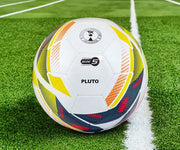At TX Football, our main objective is to deliver premium-quality soccer balls. But our love for the beautiful game goes beyond just creating these balls. Hence, we ensure that quality is maintained. Soccer ball care is essential, and we have the perfect guide for you to take care of your TX soccer balls, whether our junior or adult footballs.
TX’s Soccer Ball Care Guide
Cleaning the Ball
A soccer ball spends its life on muddy, wet, and grass surfaces. Hence, cleaning the football after every use is the first step to soccer ball care. There’s no need for a detailed wash after every game, using just a wash cloth or removing excess dirt should be enough.
However, don’t use any detergents or bleach products, since they can harm the smooth surface of the ball. Leather cleaners or water should be enough to clean up most high-quality footballs, especially the balls from TX’s inventory. Cleaning maintains the ball’s original surface and ensures it doesn’t get ruined.
Inflating the Ball
Getting kicked too much will deflate the ball. This, in turn, impacts its performance when playing, making it less bouncy, or inefficient during shoot-outs.
Now, unless you have the privilege of a professional football club to use multiple different soccer balls during every game, you’ll need to take into account soccer ball care for the one you possess. You achieve this through proper inflation.
For inflating your soccer ball to the right amount, check the manufacturer’s recommended pressure level. Over-inflation can damage the ball, while under-inflating it can impact its responsiveness. So the question is, how much air needs to be in a football?
For all TX footballs, and other brands, this is printed on the ball, from 0.6-0.8 BAR (8-12 PSI). You can inflate the ball slowly and easily, or seek a professional's help.
A Word on Football Ball Valve and Football PSI (BAR)
The proper unit for measuring ball pressure in Australia is BAR. This is also a common unit of measurement across Europe. But Globally, PSI is the more commonly used unit.
Hence, it’s essential you understand the difference between the two for your soccer ball care. Especially if you’re in possession of a TX Football that has its pressure unit mentioned after a decimal point (e.g. 0.8) instead of the usual singular unit (08 PSI).
-
What is Football PSI?
PSI levels refer to pounds per square inch, i.e. the level of pressure within a soccer ball. This ensures the ball’s bounce, shape, and overall playability is properly maintained.
It’s important to not over- or under-inflate a ball. As this impacts performance, bounce, and durability of the football. Which in turn results in an unpleasant playing experience. -
Converting PSI to BAR
As mentioned above, in Australia, BAR is commonly used for measuring air pressure. But if you’re more used to the PSI level, it’s good to know the conversion from one to the other.
To assist those using PSI, it’s helpful to know the conversion from PSI to BAR. 1 PSI is approximately equal to 0.07 BAR. Hence, any ball to be inflated 0.7-0.8 BAR corresponds to 10-12 PSI, which is true for size 5 TX footballs.
This conversion helps those who use pumps or gauges displaying only one unit. -
Recommended PSI/BAR for Different Soccer Ball Sizes
- Size 5 Soccer Balls: 0.6-0.8 BAR, i.e. 8-12 PSI
- Size 4 Soccer Balls: 0.62-0.7 BAR, i.e. 9-10 PSI
- Size 3 Soccer Balls: 0.55-0.7 BAR, i.e. 8-10 PSI
How to Inflate Footballs
To ensure soccer ball care and inflate it properly, follow a few steps to prevent damaging the ball.
- Moisten the inflating needle with valve oil or water.
- Insert the needle carefully to avoid puncturing the bladder.
- Inflate slowly to the recommended pressure, using a pump or gauge to measure the right PSI.
The First Inflation
When inflating a ball for the first time, unfold it to a maximum to loosen its bladder. This is to prevent accidental punctures. After this, apply 1–2 drops of valve oil to the valve stem or needle to ensure proper sealing and removing any debris that could cause air leaks. Insert the needle and inflate slowly. Then, leave the ball as is for 24 hours to ensure the bladder and cover properly settle.
How to Deflate a Soccer Ball?
When it comes to soccer ball care, deflating a ball is equally important. But the question is, how do you do that? Follow the steps given below to get an idea.
- Locate the football’s valve
- Moisten the tip of the needle on the ball’s pump
- Insert it slowly until it hits the bladder’s pipeline
- Hold the needle with your controlled hand and the ball with the other, and gently squeeze (or have someone do it) the ball to let out air.
If you don’t have a needle, you can still deflate the ball using a paper clip or pen. Moisten it and follow the same steps as when using a needle. However, this isn’t a recommended method as the risk of ruining the football runs high in this alternative.
Choosing the Right Surface
Soccer balls are for specific surfaces, i.e. grass or turf fields. Futsal balls are meant to be played indoors. Pavements, asphalt, or gravel surfaces better fit the use of freestyle footballs. While beach balls better perform on sand.
Soccer ball damage comes from it being used on improper surfaces. We understand that getting to a turf field may not be ideal for everyone playing football, especially people playing in their own backyard; soccer ball care is essential w.r.t the surface it’s being exposed to.
Proper Storage
Another step that’s important in caring for your soccer ball is to store it in a proper place. This means not to leave your football in extreme temperatures of either too hot or too cold.
To keep the ball’s durability intact, deflate it slightly to avoid pressuring the bladder and store it in a dry, room-temperature environment. You’d have to regularly re-inflate it before each use to maintain proper pressure.
Lastly…
At TX football, our objective goes beyond just providing high-quality soccer balls, and covers every aspect of caring for it too. For extra durability, make sure your football comes with a warranty. However, that may not always be possible. Even so, being a football fan, your love for the ball itself will ensure you’re taking care of it exactly the right way.







